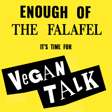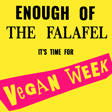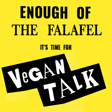
206- Gosh, all these hunters REALLY care about the environment...
Three of this week's nine stories from the vegan & animal rights 'space' feature humans across the globe using bows & arrows, guns & traps to help look after the environment. What a wonderful upsurge of community spirit by these lovely people, who are not at all fuelled by a bloodlust or any other sinister motives. Sigh. If only...
Mark, Kate & Ant are here this week to evaluate the week's news and work out where our next positive steps can be taken.
****************
Enough of the Falafel is a community of people who love keeping on top of the latest news in the world of veganism & animal rights. With the Vegan Week podcast, we aim to keep listeners (& ourselves) informed & up-to-date with the latest developments that affect vegans & non-human animals; giving insight, whilst staying balanced; remaining true to our vegan ethics, whilst constantly seeking to grow & develop.
Each week we look through news stories from the past 7 days in the world of veganism & animal rights.
If you spot any news stories that might catch our fancy, or have an idea for a discussion topic, get in touch via enoughofthefalafel@gmail.com.
*******************
This week's stories:
https://wildbeimwild.com/en/national-council-bans-import-and-trade-of-fur-produced-through-cruelty-to-animals/
https://vegnews.com/india-trump-tariff-vegan-food-cheaper
https://www.bbc.co.uk/news/articles/c5y56pryd0qo
https://www.yoursun.com/coastal/boatingandfishing/waterline-animal-rights-backers-look-to-get-bear-permits/article_7acc94e0-abcc-4d3e-ad61-c41088477f58.html
https://www.huntsabs.org.uk/smokescreen-saturday-becomes-farcical-friday/
https://www.radiokerry.ie/news/animal-rights-campaigner-describes-calls-for-deer-bounty-in-kerry-as-populist-and-crude-451058
https://www.theanimalreader.com/2025/09/12/us-state-of-montana-allows-killing-of-nearly-half-of-its-wolves/
https://www.kqed.org/news/12055745/berkeley-animal-activist-faces-prison-in-sonoma-chicken-theft-case
https://vegconomist.com/approvals/solar-foods-gras-notification-solein-air-based-protein-aiming-fda-no-questions-letter/
****************
Thanks everyone for listening; give us a rating and drop us a message to say "hi"; it'll make our day!
Kate, Mark & Ant


